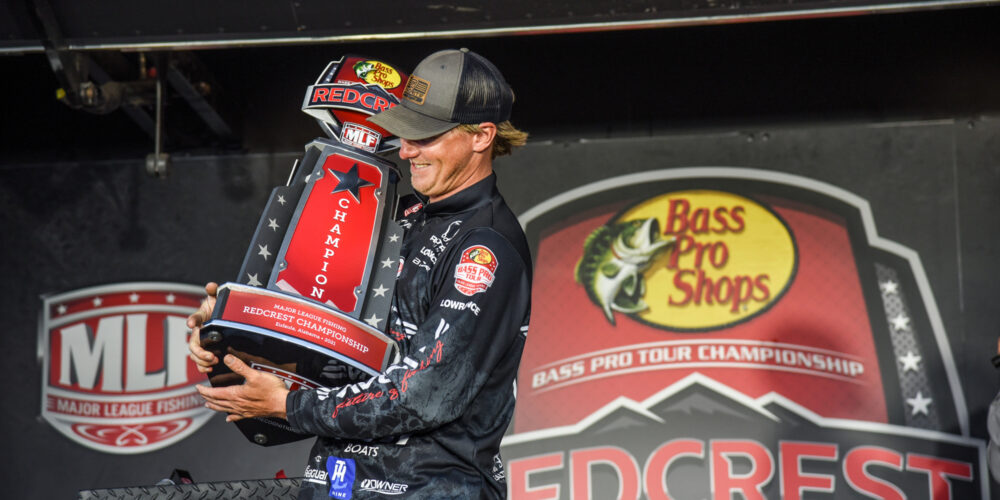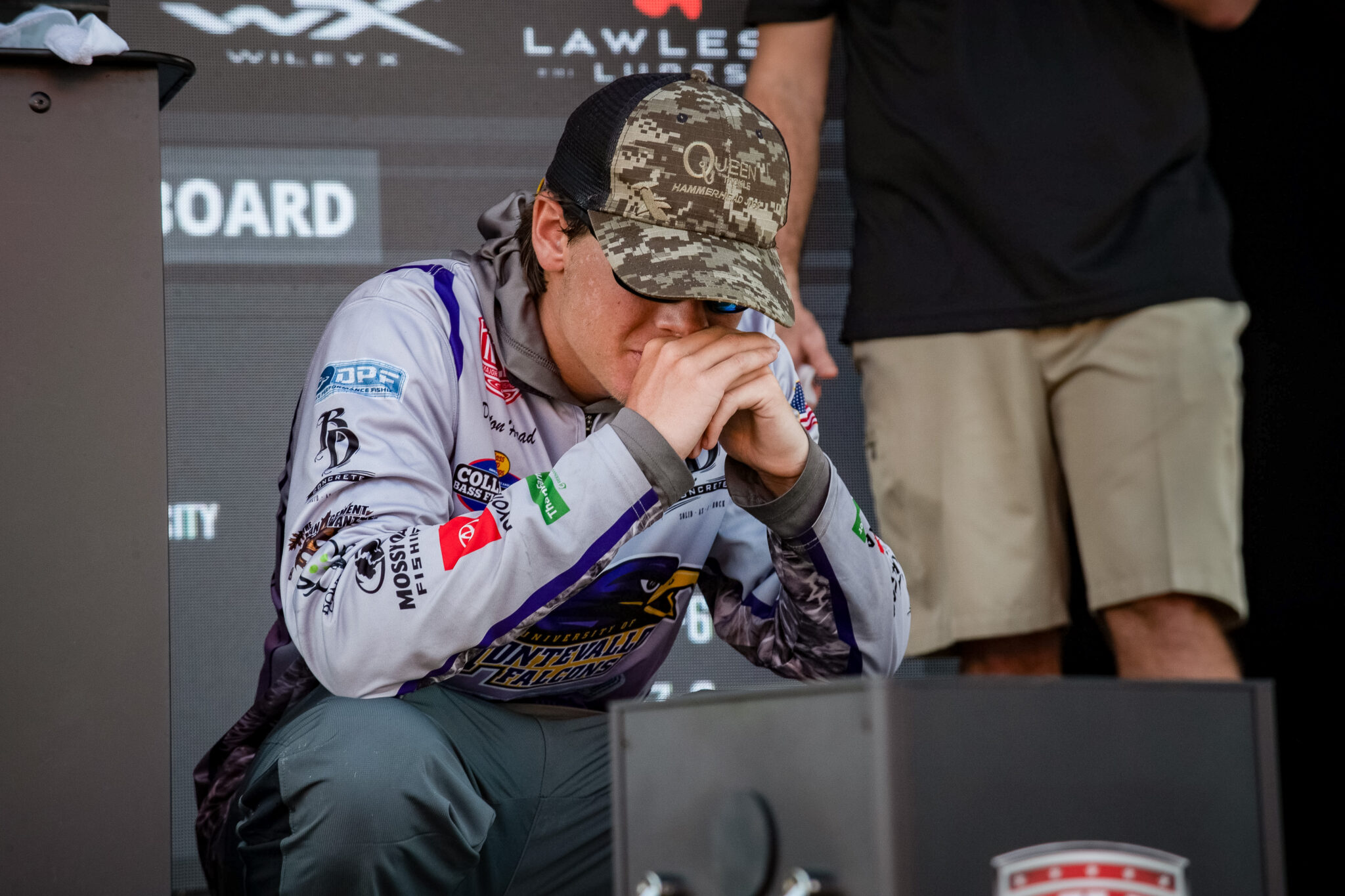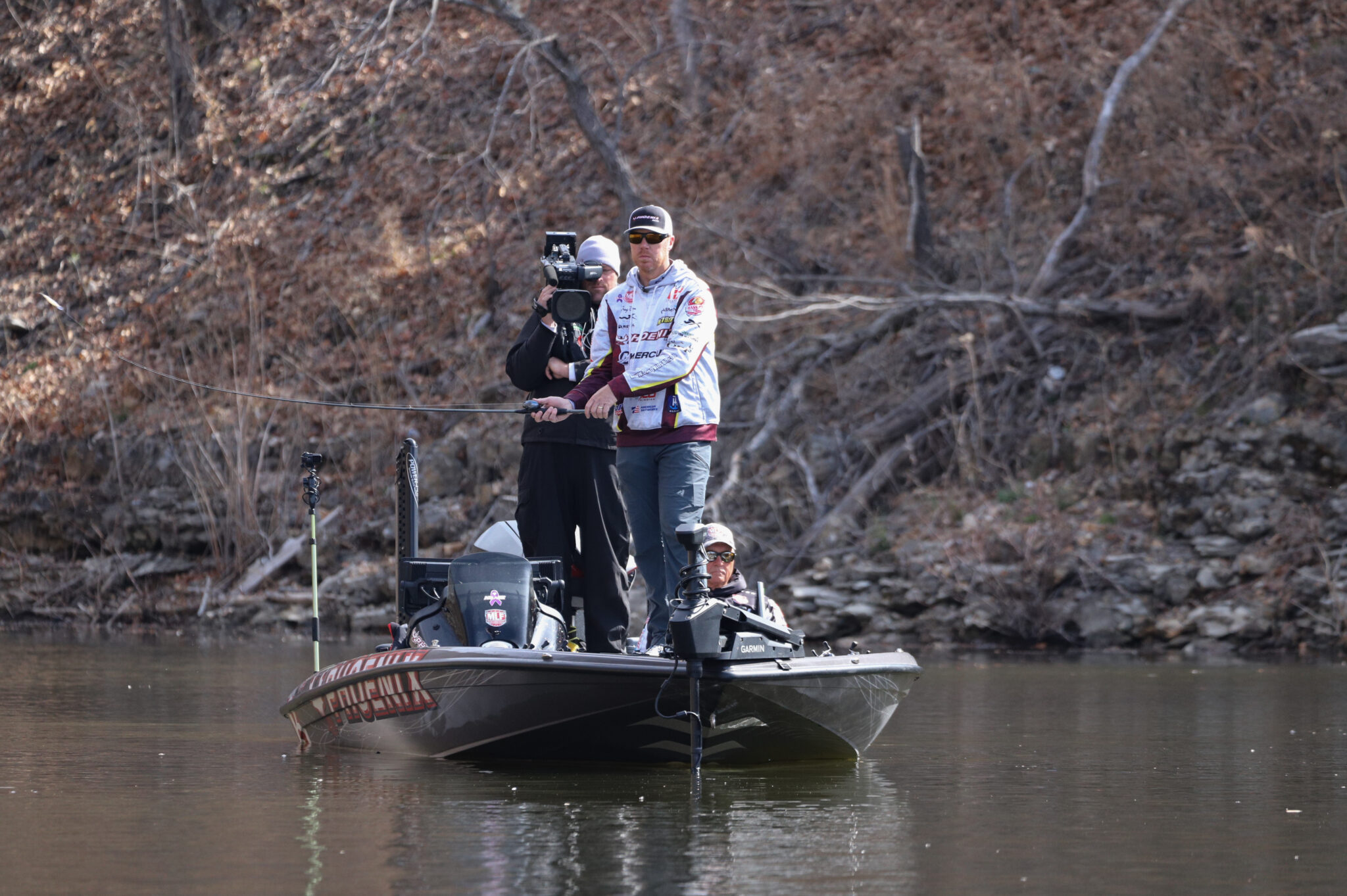Lay Lake locals have more questions than answers as REDCREST approaches

Put 50 of the best anglers in the world on the water together and you’re bound to have a fun tournament. Sprinkle in a $300,000 first-place paycheck and championship trophy to ramp the intensity up a few notches. Then place the competition on a dynamic fishery with two species of bass and myriad habitat options — just about all of which could be in play — and you have the recipe for what should be a thrilling Bass Pro Shops REDCREST Powered by OPTIMA Lithium on Lay Lake.
Springtime events often arrive with an air of mystery, and with a recent storm resulting in an influx of dirty water and a warming trend in the forecast, that seems magnified this week. Even Dustin Connell, the 2021 REDCREST champion who lives about 30 minutes from takeoff at Beeswax Creek Park, admitted prior to the start of Sunday’s practice that he has no idea how this derby is going to go down.
“I really couldn’t tell you how the tournament is going to be won,” Connell said. “But I do know they’re going to catch ‘em really good. The fishery is very, very healthy right now. So they’re going to catch a ton of ‘em.”
Competition will start Thursday and run through Sunday, all of it streamed live on MLFNOW! from 7:15 a.m. to 4 p.m. CT each day.
A diverse field for a diverse fishery
Part of what will make REDCREST 2024 unique has nothing to do with Lay Lake or its bass population but the 50-angler field trying to catch ’em.
For the first time, this year’s event will include a host of winners from the 2023 Tackle Warehouse Invitationals, the Toyota Series Championship and the All-American, plus one representative from the Abu Garcia College Fishing ranks. As a result, 16 of the anglers will compete in REDCREST for the first time. They’ll join a group that includes 14 former championship event winners (REDCREST, Forrest Wood Cup, Bassmaster Classic), including Kevin VanDam. The four-time Classic champ is interrupting his retirement to compete on the fishery where he won his 2010 title.
Among the REDCREST rookies is Dalton Head. The University of Montevallo junior earned his spot in the field by winning the 2023 College Fishing National Championship alongside partner Peyton Harris, then besting Harris at the Toyota Series Championship.
The 21-year-old experienced his first welcome-to-the-big-leagues moment shortly after starting practice Sunday morning.
“First place I pulled into today had Jacob Wheeler and Edwin Evers in it,” Head said with a chuckle. “And I was like alright, yeah, this is how it’s going to go. It’s pretty intimidating, honestly. … But hey, I’m there to fish just like they are, so just trying to keep a level head.”

While Head may be the least experienced angler in the field — he’s the only one not competing full-time on a professional tour in 2024 — he does have a unique advantage. He grew up fishing Lay and has made the short drive from campus regularly in recent years. That familiarity with his surroundings has helped calm his nerves.
“It’s just like if we went to Jacob Wheeler’s home lake,” Head said. “Like, not saying that I’m that good, just saying that it helps in that sense of being able to be like, ‘OK, well, they’re not here, and I know they go here, here or here.’ And you can just bounce a lot more efficiently. You don’t have to guess.”
Head will try to pull off a balancing act this week, walking the line between feeling starstruck and embracing the opportunity to fish alongside some of his heroes, between leaning on his Lay Lake knowledge and keeping an open mind about what the fish are up to. If he’s able to pull it off, it would be quite the jump start for an angler who’s said he plans to pursue a tournament-fishing career full time after graduation.
“It’s just trying not to overwhelm myself, because I’ve been on this lake so many times, it’s not even funny,” Head said. “So, I’m just trying to keep a level head, keep everything in play and not cancel anything out just because I think I know.”
Decisions, decisions
Tournament success always boils down to making the right choices. This week, it feels like there’s extra decisions to be made — and, given the stakes, extra pressure to be right.
First up will be choosing whether to target largemouth or Alabama/spotted bass. Like the entire Coosa River chain, Lay has an abundant population of the latter. For those unfamiliar with the species, these are different than the Kentucky spots that live in, say, the Ozark reservoirs — Alabama bass regularly grow into the 5-pound range. However, the largemouth on Lay can get even bigger.
“It’s got really good quality largemouth – a good population of 6-, 7-, 8-pounders in there,” Wetumpka, Alabama, native Greg Vinson said. “Last year there was even a 10-pounder caught there. And it’s got a really good population of spotted bass that are 5 pounds or better. … So, there is something for everybody.”
Conditions and format could both influence which species represents the winning fish. Head believes the every-fish-counts scoring (with a 2-pound minimum weight) will prompt more anglers to target spots than otherwise would. But Connell thinks the recent push of dirty water paired with daytime highs in the 70s might bolster the shallow largemouth bite.
Given the changing conditions and the fact that weights will reset after the two-day Qualifying Round and again after the Knockout Round, Vinson predicted the top anglers will be able to catch both species throughout the week.
“I’ve got to develop a strategy that involves both the spots and the largemouth,” he said. “I don’t know if the population of either is enough to carry an angler all the way through our event with every fish counts. So I think it will take a mix.”

Lay not only offers multiple species for anglers to target, but a range of places to catch them. Anglers will have their pick between fishing the riverine upper end of the reservoir or the more reservoir-like lower section. A few might even brave the turbulent tailrace beneath the Logan Martin dam.
Both sections include plenty of offshore cover like brushpiles, as well as emergent vegetation and wood in the shallows. While most of the fish figure to be in prespawn mode, it’s not out of the question a wave of bass could be on beds around that cover. Connell and Vinson both believe swimming a jig or flipping amid the water willow that the Coosa chain is known for will be a major player.
“I would say for sure the grass bite is going to be good,” Connell said. “There’s going to be a lot of spotted bass caught up shallow. It’s going to be a mixture. I think swimming a jig is going to be a good deal, flipping — your typical prespawn stuff. Jerkbaits, stuff like that.”
Connell said any of the above habitat could produce the winning fish. In a bit of an upset, though, he doesn’t think this event will be won using forward-facing sonar to target suspended fish — notable considering he’s one of the best in the world at doing so. While ‘Scoping with a jighead minnow can never be ruled out in 2024 (and it could still be a player for an angler targeting isolated cover like brushpiles), Connell believes too many fish will be around the banks for an angler to win on bait-chasing bass.
“These fish are wanting to move shallow, so I don’t see a ton of ‘em getting caught like that,” he said. “I mean, it would be different, but I don’t see that playing really big.”
The winning formula
Add another question to the list of unknowns: How much weight will it take to survive each of the two cuts and, ultimately, take home the trophy? With REDCREST representing the first major every-fish-counts tournament held on Lay, anglers don’t have a reference point for what constitutes a good day.
Vinson predicted 30 pounds will be solid, but perhaps not enough to win the single-day Championship Round shootout.
“I’m thinking 30 pounds a day in our format is going to be strong,” he said. “I don’t know if that’s enough to win, though. It totally depends on the strength of the bite. … But I believe anywhere from 30 to 40 pounds a day is going to be a really strong day, and if someone can do that consistently, I don’t see why they wouldn’t have a shot on Championship Sunday.”
No matter how much weight it takes to get there, each of the three Lay locals agreed that the event almost certainly won’t be won by an angler fishing the same school, the same spot or even the same pattern all four days. Connell believes the deciding factor could be finding an area where a wave of big females are moving shallow. Vinson and Head both predicted it’ll come down to who can make the right adjustments — not just from one day to the next, but hour to hour.
“That’s how this lake fishes: You run to something, and then there’s going to be another bite window on something else; or the weather might change, clouds might come in for 45 minutes, and then you go transition to something else,” Head explained. “It’s a very, very instinctive lake.”
All those question marks, and the fact that competitors don’t have to worry about Angler of the Year points this week, will place a premium on strategy. Everyone in the field will be “fishing to win,” a mindset Connell always employs and has used to collect five Bass Pro Tour wins. At REDCREST, that might look like catching just enough weight to survive during the Qualifying and Knockout Rounds, practicing during the event whenever possible and running new water during the Championship Round in search of the mother lode rather than sticking where an angler has already found fish and knows he can catch a few more.
“You’ve got to shoot to win,” Connell said. “You’ve got to be conservative during the first part of the tournament, but you could very easily catch all your fish. You’ve got to manage fish. There ain’t any points in this one, so you gotta go for it. And I’ve definitely been doing that.”